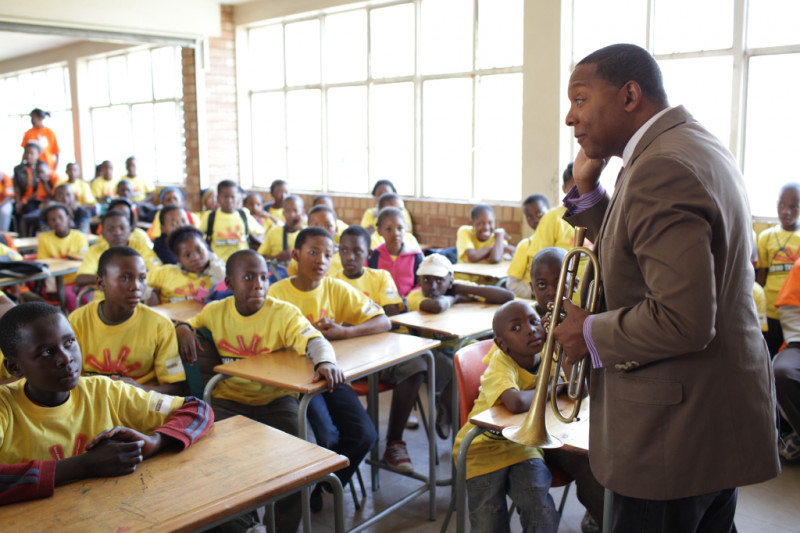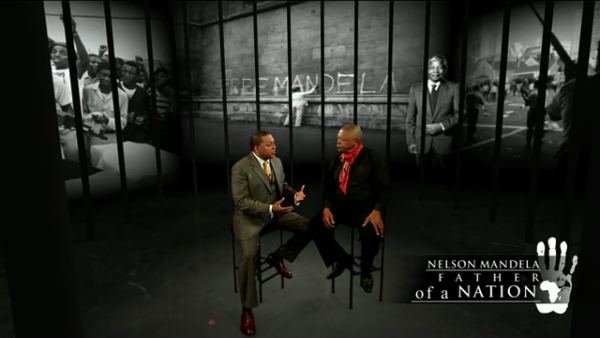On Nelson Mandela’s legacy

Wynton visiting the kids at “Teboho Trust” in Soweto, South Africa. August 27, 2011
We are all trapped in the unresolved battles of our ancestors, limited by our inability to conceive beyond the boundaries of our culture and education. From primal,‘survival of the fittest’ instincts to the refined segregations developed by the most sophisticated amongst us, we have a deep tradition of degrading ‘other’ human beings in the frenzy to control resources, to amass wealth and to confer status through arbitrary social constructs.The repetition of these constructs across generations produces conventions and ‘isms’ that we confuse with reality. Of the many ‘isms’ that prevent us from realizing our true global identity, racism is one of the most irrational and deeply rooted.
The exploitation of serf, peon and slave labor has undergirded the economic success of civilizations since the beginning of commerce. In recent centuries, however, with Africans being exported throughout the New World as slaves, the historically unfair treatment of less fortunate people, regardless of color, gradually morphed into an international custom of social and cultural degradation of those with darker skin tones and more Negroid features.
In the Louisiana of my youth, this was a well-known refrain, “If you’re white, you’re alright. If you’re brown, stick around. If you’re black, get back.” I knew this schoolyard saying to be much more than street corner foolishness, because we all lived it. But, I misperceived it to be a local problem, endemic to the American South. On a high school band trip to Mexico, however, I noticed great social and economic disparity by color. Upon moving to New York, I soon learned that a similar equation, though much more elegantly calibrated, was in place. A few years later, as a young man traveling around the world, I observed the same inequalities in Brazil, France, and England to name a few countries. Even in Japan, a good friend felt no shame in telling me that darker skin and Negroid features were not considered desirable or beautiful.
Being ignorant of world affairs at the time, I felt it was poetic irony to discover that even in South Africa, home of the mighty Zulu Nation, many Africans themselves were subject to and accepted the same irrational hatred for Negro physiology and culture. Painfully, I understood that the childish rhyme of my youth was an unacknowledged credo for much of the globe.
Though most conflict in our world is over the ownership of natural and man-made assets, the most heated and heartfelt battles are about identity. For the vanquished there is seldom pity, but there is often the solace of slogans: “This is God’s Will,” or “It’s Nature’s way, don’t worry too much about it.” The misunderstood laws of natural selection are quoted, “The strongest survive,” and “The top of the food chain eats, but everything below is food.” All types of atrocities are excused as examples of human nature. Curious, because human beings are just as naturally given to insight, to compassion and even to sacrifice for the benefit of strangers. We are often capable of rising above bad education and ignorant traditions. As individuals, we do so every day. As members of some identifiable subset, we need the guiding hand of quality leadership.
From the front lines of a most violent struggle over the identity of his nation, Mr. Rolihlahla ‘Nelson’ Mandela emerged as a powerful, charismatic force for change. Incarcerated through the sweetest years of his life, he paid a deep deep price for his authority and position of command in this bitterly contested war. Mr. Mandela would wield the divine and pragmatic healing power of reason and of deep empathy to halt the grinding gears of murder, injustice and revenge that defined the physical and psychological borders of his country.
For himself, his family, his nation and for all of us, he tore away the chain-mail shroud of imposed and accepted misconceptions about race, class, religion and gender to reveal something deeper than our genetic disposition to conquer, deeper than the egoistic satisfaction of dominating ‘inferiors’, even deeper than the nationalization of our violent and tribal past that is often sanitized and mistaken for heritage.
Through his actions, he revealed a transcending vision that embraced the potential in every other person and viewed interactions with every other group of people as the opportunity to achieve harmony through integration. He renounced competition and conquest as the modes through which we should conduct our affairs, and instead, embodied those essentials that make us most human: compassion, generosity, cooperation and love. Because he reached, we reached. But he was not alone, as we also are not alone.
From William Wilberforce to Frederick Douglass to Mahatma Gandhi and Dr. Martin Luther King Jr., Nelson Mandela was the latest in an international roll call of soul stirring torchbearers who successfully used humanist principles to undermine the enculturation of abject peonage on the basis of pigmentation. Along with thousands of Afro-Americans who insisted on exporting the victorious legal and economic tactics of the American Civil Rights movement, and with Americans of all hues, and with people from all walks of life from all over the world, Dr. Mandela and South African freedom fighters were supported by a swelling chorus of international voices raised in affirmation. The deafening crescendo of this choir helped overthrow apartheid and, with Madiba’s ascendance to his nation’s Presidency, signaled a stunning political victory for universal humanism.
As President, his vision of unity through sacrifice mobilized South Africans to reach for the boundless potential in their collective creativity. He spoke fundamental wisdom in the language of action, and his insights made healing a possibility for a land seemingly broken beyond repair. The success of Madiba’s journey provided an inspirational narrative for a world that seems too fragmented and complicated to ever come together.
Public voices that have the power to heal are often sacrificed too soon, while preachers of divisiveness and hatred live on. In the 1960’s, the assassinations of America’s most progressive young leadership left a void that has remained unfilled. These egregious acts left our nation with the nagging feeling that to be truthful in public, to powerfully attack positions endorsed by those in control of such things, is to welcome danger and destruction.
Perhaps we can find some measure of relief that this time, one of the world’s most impactful healers was not silenced by violence, but was increasingly celebrated into his10th decade.
Nelson Mandela has passed on. As is customary, we will grieve for a measure, and then go on as we have always gone on. Some of us will stand, and some will sit after a long time of standing. Some will run, or be crushed where we stand. But, many more of us will fall back in stony silence as present and coming leaders are slandered or bribed into the shadows, or imprisoned or outright slaughtered. That’s how it goes with public leaders.
However, for his family, his country and for all of us, Dr. Mandela staked his life on the transformative power of our indivisible human value. He traversed blood soaked minefields of inbred divisiveness, self-evident entitlement and righteous hate. On death ground, where even the greatest citizens are struck down, Madiba danced for 95 years. Let us salute his life by remembering his legacy, speaking his name at the appropriate times, and reflecting his example in our daily actions.
Wynton


Comments
very touching words, maestro wynton
nick on Jan 26th, 2014 at 11:21pm
Dear Mr. Marsalis,
Paragraph 8: Your five most beautiful words, “Because he reached, we reached.”
Last year in Tampa, I told you about my experience as a child, being the only little white girl in an all black church. It could have been lonely and scary for a child, but they reached for me, and I reached back. Even now, forty-some years later, I still dream black arms reaching, offering, and passing white platters. Then I have to write poetry in my head to try to hold on to that feeling. Those brothers and sisters could have left me sitting in the front row, the preacher’s kids’ row, and I may never have known how to get to them. When I read those five most simple and beautiful words today, “Because he reached, we reached,” I had to hang my head and breathe, trying to hold all of my thankfulness for that reaching inside. Because they reached, I reached. Now, I teach. I reach, and mostly, they reach back. Sometimes they contact me and tell how they’re reaching out to the next person, the next group, the next generation.
“Because he reached, we reached.” Thank God.
charmaine jones on Dec 11th, 2013 at 3:39pm